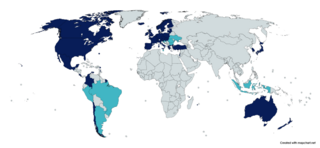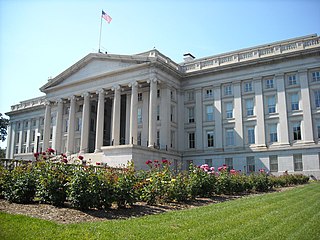Related Research Articles
The economy of Gibraltar consists largely of the services sector. While part of the European Union until Brexit, the British overseas territory of Gibraltar has a separate legal jurisdiction from the United Kingdom and a different tax system. The role of the UK Ministry of Defence, which at one time was Gibraltar's main source of income, has declined, with today's economy mainly based on shipping, tourism, financial services, and the Internet.
A health system, health care system or healthcare system is an organization of people, institutions, and resources that delivers health care services to meet the health needs of target populations.
A subsidy or government incentive is a type of government expenditure for individuals and households, as well as businesses with the aim of stabilizing the economy. It ensures that individuals and households are viable by having access to essential goods and services while giving businesses the opportunity to stay afloat and/or competitive. Subsidies not only promote long term economic stability but also help governments to respond to economic shocks during a recession or in response to unforeseen shocks, such as the COVID-19 pandemic.
A tax treaty, also called double tax agreement (DTA) or double tax avoidance agreement (DTAA), is an agreement between two countries to avoid or mitigate double taxation. Such treaties may cover a range of taxes including income taxes, inheritance taxes, value added taxes, or other taxes. Besides bilateral treaties, multilateral treaties are also in place. For example, European Union (EU) countries are parties to a multilateral agreement with respect to value added taxes under auspices of the EU, while a joint treaty on mutual administrative assistance of the Council of Europe and the Organisation for Economic Co-operation and Development (OECD) is open to all countries. Tax treaties tend to reduce taxes of one treaty country for residents of the other treaty country to reduce double taxation of the same income.

Donald James Johnston, was a Canadian lawyer, writer and politician who was Secretary-General of the Organisation for Economic Co-operation and Development (OECD) from 1996 to 2006. He was the first non-European to head that organization. From 1978 to 1988, Johnston was a Liberal Party member of the Canadian parliament and served in the cabinets of prime ministers Pierre Trudeau and John Turner. In addition, he was the president of the Liberal Party of Canada from 1990 to 1994. Johnston was an Officer of the Order of Canada, and an Officer of the French National Order of the Legion of Honour.
Tax competition, a form of regulatory competition, exists when governments use reductions in fiscal burdens to encourage the inflow of productive resources or to discourage the exodus of those resources. Often, this means a governmental strategy of attracting foreign direct investment, foreign indirect investment, and high value human resources by minimizing the overall taxation level and/or special tax preferences, creating a comparative advantage.

The Trade Union Advisory Committee to the OECD (TUAC) is the interface of the Organisation for Economic Co-operation and Development (OECD) with organized labour. TUAC has 59 affiliated trade union centres in 31 OECD countries, representing more than 66 million workers. It also has associate members in Brazil, Indonesia, Russia and South Africa.

Tax policy refers to the guidelines and principles established by a government for the imposition and collection of taxes. It encompasses both microeconomic and macroeconomic aspects, with the former focusing on issues of fairness and efficiency in tax collection, and the latter focusing on the overall quantity of taxes to be collected and its impact on economic activity. The tax framework of a country is considered a crucial instrument for influencing the country's economy.
Harmful Tax Competition: An Emerging Global Issue is a report issued by the Organisation for Economic Co-operation and Development's Centre for Tax Policy and Administration.
David John Bradbury is an Australian former politician. He was a Labor member of the Australian House of Representatives, representing the Division of Lindsay, in New South Wales, from 2007 until 2013. Bradbury was the Minister for Competition Policy and Consumer Affairs, Assistant Treasurer, Minister Assisting for Financial Services and Superannuation, and Minister Assisting for Deregulation. He is currently the Head of Tax Policy and Statistics at the Organisation for Economic Co-operation and Development's Centre For Tax Policy and Administration.
A tax haven is a term, often used pejoratively, to describe a place with very low tax rates for non-domiciled investors, even if the official rates may be higher.

The Convention on Mutual Administrative Assistance in Tax Matters is a convention to facilitate the entering into bilateral tax information exchange agreements between state parties. The Convention was developed by the OECD and the Council of Europe and was open for signature to members of both organizations on 25 January 1988, and entered into force in 1995.
The Global Forum on Transparency and Exchange of Information for Tax Purposes was founded in 2000 and restructured in September 2009. It consists of OECD member countries as well as other jurisdictions that have agreed to implement tax related transparency and information exchange. The forum works under the auspices of the OECD and G20. Its mission is to "implement the international standard through two phases of peer review process". It addresses tax evasion, tax havens, offshore financial centres, tax information exchange agreements, double taxation and money laundering.

The Organisation for Economic Co-operation and Development is an intergovernmental organisation with 38 member countries, founded in 1961 to stimulate economic progress and world trade. It is a forum whose member countries describe themselves as committed to democracy and the market economy, providing a platform to compare policy experiences, seek answers to common problems, identify good practices, and coordinate domestic and international policies of its members.
Financial services in Gibraltar refers to the services provided in the British Overseas Territory of Gibraltar by the finance industry: banks, investment banks, insurance companies, credit card companies, consumer finance companies, government-sponsored enterprises, and stock brokerages.

Base erosion and profit shifting (BEPS) refers to corporate tax planning strategies used by multinationals to "shift" profits from higher-tax jurisdictions to lower-tax jurisdictions or no-tax locations where there is little or no economic activity, thus "eroding" the "tax-base" of the higher-tax jurisdictions using deductible payments such as interest or royalties. For the government, the tax base is a company's income or profit. Tax is levied as a percentage on this income/profit. When that income / profit is transferred to a tax haven, the tax base is eroded and the company does not pay taxes to the country that is generating the income. As a result, tax revenues are reduced and the country is disadvantaged. The Organisation for Economic Co-operation and Development (OECD) define BEPS strategies as "exploiting gaps and mismatches in tax rules". While some of the tactics are illegal, the majority are not. Because businesses that operate across borders can utilize BEPS to obtain a competitive edge over domestic businesses, it affects the righteousness and integrity of tax systems. Furthermore, it lessens deliberate compliance, when taxpayers notice multinationals legally avoiding corporate income taxes. Because developing nations rely more heavily on corporate income tax, they are disproportionately affected by BEPS.
The Republic of Panama is one of the oldest and best-known tax havens in the Caribbean, as well as one of the most established in the region. Panama has had a reputation for tax avoidance since the early 20th century, and Panama has been cited repeatedly in recent years as a jurisdiction which does not cooperate with international tax transparency initiatives.
The OECD G20 Base Erosion and Profit Shifting Project is an OECD/G20 project to set up an international framework to combat tax avoidance by multinational enterprises ("MNEs") using base erosion and profit shifting tools. The project, led by the OECD's Committee on Fiscal Affairs, began in 2013 with OECD and G20 countries, in a context of financial crisis and tax affairs. Currently, after the BEPS report has been delivered in 2015, the project is now in its implementation phase, 116 countries are involved including a majority of developing countries. During two years, the package was developed by participating members on an equal footing, as well as widespread consultations with jurisdictions and stakeholders, including business, academics and civil society. And since 2016, the OECD/G20 Inclusive Framework on BEPS provides for its 140 members a platform to work on an equal footing to tackle BEPS, including through peer review of the BEPS minimum standards, and monitoring of implementation of the BEPS package as a whole.
International tax planning also known as international tax structures or expanded worldwide planning (EWP), is an element of international taxation created to implement directives from several tax authorities following the 2008 worldwide recession.

Sophie Chatel is a Canadian politician who was elected to represent the riding of Pontiac in the House of Commons of Canada in the 2021 Canadian federal election. Prior to being elected, she was a civil servant.
References
- ↑ "Statement by the Secretary-General on the Centre for Tax Policy and Administration". www.oecd.org.
- ↑ "More Information on the Harmful Tax practices Work", OECD Centre for Tax Policy and Administration, OECD.org, 17 July 2007